What's coming up in Parliament next week?
- Published
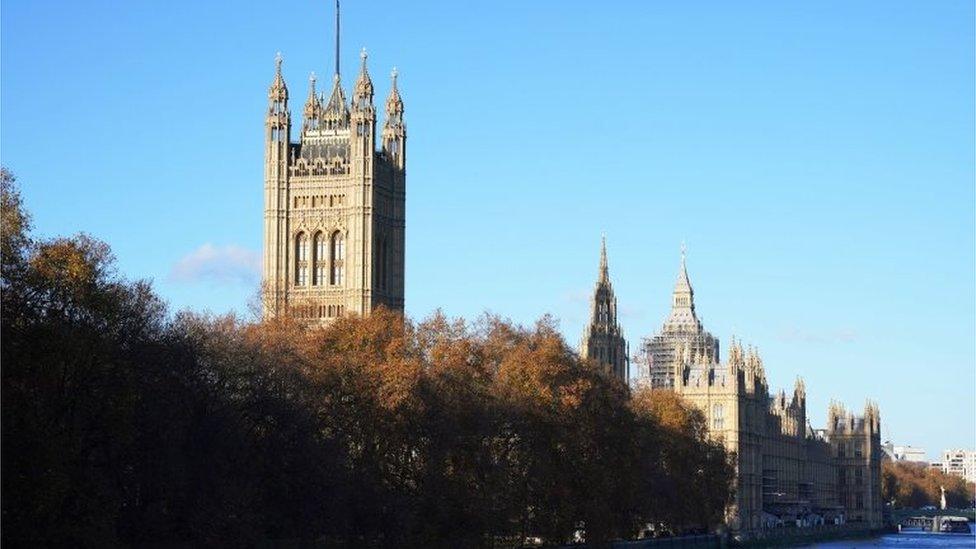
Against a background of nervy politics and rekindled pandemic anxiety, there's a whole lot of legislating and committee action going on.
The main flashpoints will probably by in the Lords, where peers are sharpening their claws for the Dissolution and Calling of Parliament Bill, which promises many happy weeks of constitutional argument.
A look at the coming week's committee agenda provides a good guide to the many problems brewing in a whole spectrum of policy areas: benefits, environment, defence spending, rape prosecutions, and near-bankrupt local councils, to name but a few.
Watch out for some behind-the-scenes developments.
First there will be some negotiations between the government and the opposition in the Lords over the considerable number of outstanding issues from the marathon committee stage consideration of the Police, Crime, Sentencing and Courts Bill.
In particular, the new public order offences the government wants to add to tackle eco-protesters like Extinction Rebellion and Insulate Britain are likely to get attention.
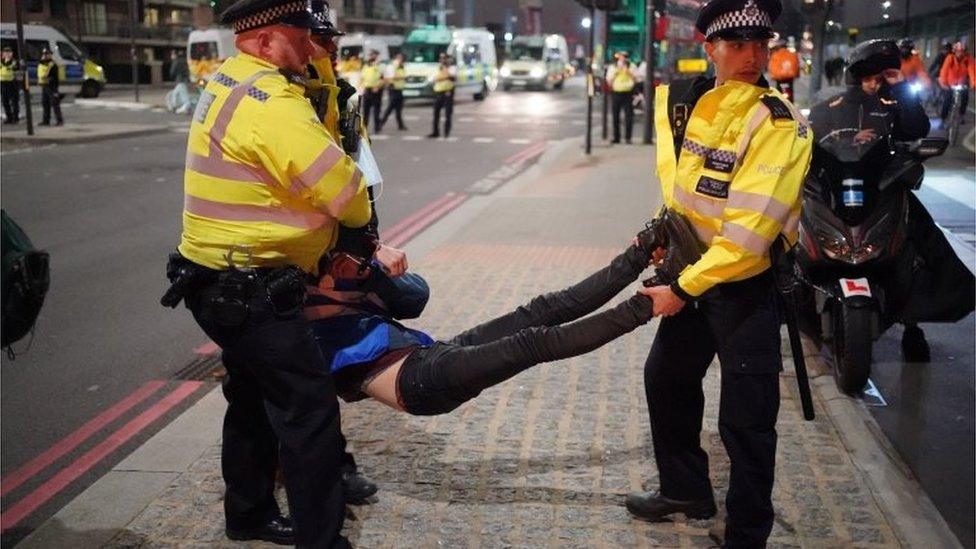
Insulate Britain activist removed by police in south London
The bill is back for Report Stage consideration in the Lords the following week, and will undoubtedly face serious attempts to rewrite many of its key provisions, as well as to add new ones.
And in the Commons the fallout from the Owen Paterson affair continues, with the Standards Committee set to publish a report on the ethics rules for MPs, and the system to enforce them, on Monday.
Committee chair Chris Bryant is due to make a statement on whatever recommendations it makes in the Commons on Thursday.
Monday 29 November
The Commons week opens (14:30 GMT) with an hour of questions to ministers at the newly renamed Department for Levelling Up, Housing and Communities (proprietor, Michael Gove).
Look out, after that, for any government statements or urgent questions - perhaps a further update on the emergence of a new Covid-19 variant?
The main law-making is the Second Reading debate on the Leasehold Reform (Ground Rent) Bill, the measure to restrict ground rents on newly created long residential leases to a peppercorn level, ending the trend for freeholders to ratchet up ground rents, at least for new leases.
The bill has already cleared the Lords.
The day's Petitions Committee debate in Westminster Hall (16:30) is on e-petition 578676, on access to salbutamol inhalers - it calls for the government to bring in "Lauren's Law", which would allow non-prescribed storage of salbutamol reliever inhalers in commercial kitchens.
This is a campaign which followed the death of 19-year old Lauren Reid, who suffered a cardiac arrest caused by an asthma attack while working as a chef. Schools can already keep emergency salbutamol inhalers.
On the Committee Corridor, Treasury (15:15) has a session on economic crime, with economic secretary to the Treasury John Glen and security and borders minister Damian Hinds, on how the government plans to combat rising fraud cases.
And, with a number of councils in deep financial trouble, Public Accounts (16:00) looks at the system of local government finance.
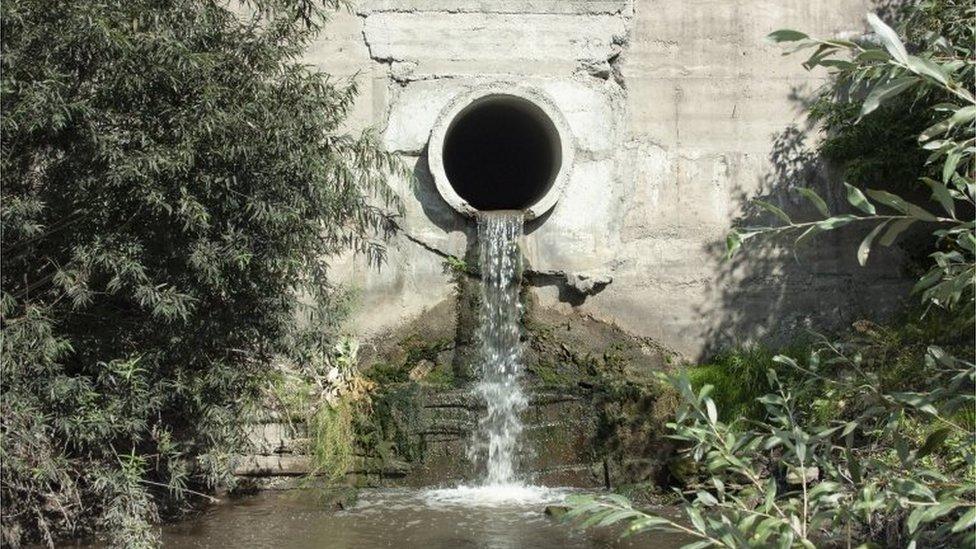
Peers will debate cutting sewage discharges into rivers
In the Lords (14:30) questions to ministers range across donating Covid vaccines to other countries, talks with water companies to cut sewage discharges into rivers, strengthening the "fit-and-proper-person" test for ownership of football clubs, and the implications of selling missiles to Ukraine.
That's followed by a couple of legislative chores; first a brief Third Reading rubber-stamping of the Armed Forces Bill, then Report Stage consideration of the Public Service Pensions and Judicial Offices Bill, where the key issue is around the judicial retirement age.
And then they turn to the Second Reading of the Northern Ireland (Ministers, Elections and Petitions of Concern) Bill, which makes a series of changes to the system of devolved government, aimed at preventing another long interlude in which the devolved institutions are collapsed.
Tuesday 30 November
The Commons day begins (11:30) with Foreign Office questions - after which Conservative Alberto Costa continues the recent vogue for Ten Minute Rule Bills on green issues, with a measure to require filters in washing machines to stop microplastic fibres escaping.
The main debate will be on an SNP motion, yet to be announced.
In Westminster Hall, Green MP Caroline Lucas has a debate on the wellbeing economy approach to meeting climate goals (16:30).
On the Committee Corridor, Justice Secretary and Lord Chancellor Dominic Raab has his debut before the Justice Committee (14:30), with issues like the courts backlog, reform of the Human Rights Act, legal aid, prison building, prisoner mental health and reforms to the parole system likely to feature.
Elsewhere, gold medallists from the Olympics and Paralympics will give evidence to Digital, Culture, Media and Sport (10:00) as they open their inquiry into the future of the National Lottery. The committee will examine how athletes benefit from Lottery funding.

Swimmer Adam Peaty will give evidence to MPs on the lottery
In the Lords (14:30) ministers field questions on abuse against older people and on using British steel to build warships for the Navy.
The day's legislating opens with the Report Stage of the Animal Welfare (Sentience) Bill - now expected to be unamended, despite some Conservative grumpiness about its contents.
And then, listen out for the dull thud of constitutional markers being put down as the Dissolution and Calling of Parliament Bill gets its Second Reading.
This is the measure to replace the coalition-era Fixed-Term Parliaments Act and revive the previous system under which a prime minister can advise the sovereign to dissolve Parliament and call an election at a moment of their choosing.
It will undoubtedly be a feast for the Lords constitutionalists - and watch out for speeches foreshadowing an amendment which would postpone a change in the system until after the next election. There's already an impressive list of peers down to speak.
Wednesday 1 December
The Commons opens (11:30) with half an hour of questions to former Business Secretary Alok Sharma, in his role as President of the COP26 climate change summit.
The summit was held in Glasgow earlier this month, but his role in following the commitments made, and laying the groundwork for next year's summit in Cairo, continues - and many parliamentarians hope his question times will continue, too, so as to allow MPs to scrutinise his activities.
That's followed, at noon, by Prime Minister's Questions.
The day's Ten Minute Rule Bill, from Labour's Matt Western, is on the planning rules for quarries - he wants to introduce a presumption against allowing quarries close to where people live, because of the health dangers from silica dust.
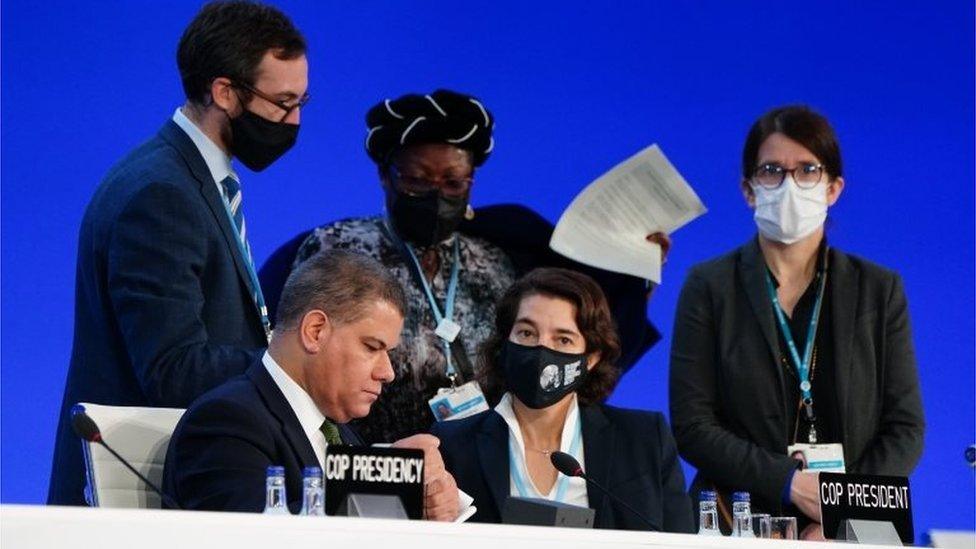
MPs will question Alok Sharma about the COP26 climate conference
Then MPs turn to the detail of the Finance Bill, the measure that enacts the tax changes announced in the Budget - this is a Committee of the Whole House, in which any MP can take part, and it can sometimes be rather a ritualistic even perfunctory occasion.
But there will be some heavy-duty Labour amendments around the proposed cuts in the banking surcharge and around the failure to bring in "oven-ready" anti-money laundering legislation, including a sweeping new law against failing to stop a crime, which is designed to stop financial institutions "looking the other way", rather than querying suspicious flows of enormous sums of money.
In Westminster Hall (09:30) Labour's Emma Hardy has a debate on reductions in community debt advice and Conservative Caroline Ansell has a debate on introducing a GCSE in natural history (14:30).
Committee action includes Work and Pensions (09:15) beginning its new inquiry into health assessments for benefits with two expert witnesses discussing how the assessment process can be improved for people claiming Personal Independence Payment, Employment and Support Allowance and Disability Living Allowance.
Home Affairs (10:00) takes evidence from the Law Society, the Bar Council, the Criminal Bar Association and The Law Commission on the investigation and prosecution of rape, and why prosecution rates for rape are so low.
Petitions (15:00) concludes its inquiry into Tackling Online Abuse, by questioning tech and digital economy Chris Philp on how the government's forthcoming Online Safety Bill will tackle online abuse, and on whether it should go further in acting against anonymous abuse online, as requested in several e-petitions to Parliament.
In the Lords (15:00) ministers field more questions on sewage discharges into rivers (this time from the Green party's Baroness Jones) and on the driving test for HGVs
After that, peers rattle through the Report Stage of the Rating (Coronavirus) and Directors Disqualification (Dissolved Companies) Bill before moving on to the Second Reading of the National Insurance Contributions Bill - where there will be issues around relief for employers in free ports, relief for employers of ex-service personnel, and anti-tax avoidance rules.
The main business is detailed consideration of the Budget measures contained in the Finance Bill - this, theoretically at least, is important business, but the debates are usually pretty low-key affairs, with few issues pushed to a vote.
Thursday 2nd December
MPs being (09:30) with 40 minutes of International Trade questions, followed by the weekly statement on the next week's Commons agenda, from the Leader of the House, Jacob Rees Mogg.
A brief but important moment will be a statement from the chair of the Standards Committee, Labour's Chris Bryant, on the publication of their latest report on the ethics rules for MPs, in the wake of the Owen Paterson case.
The normal form is for a short statement and a few quick questions, but given the sensitivity of this issue, the chair might let them go on a little longer.
The committee (which has not published its report as I write) may well recommend changes to the rules - but it will be for the government to put down a motion to make any changes, and to schedule a debate on them.
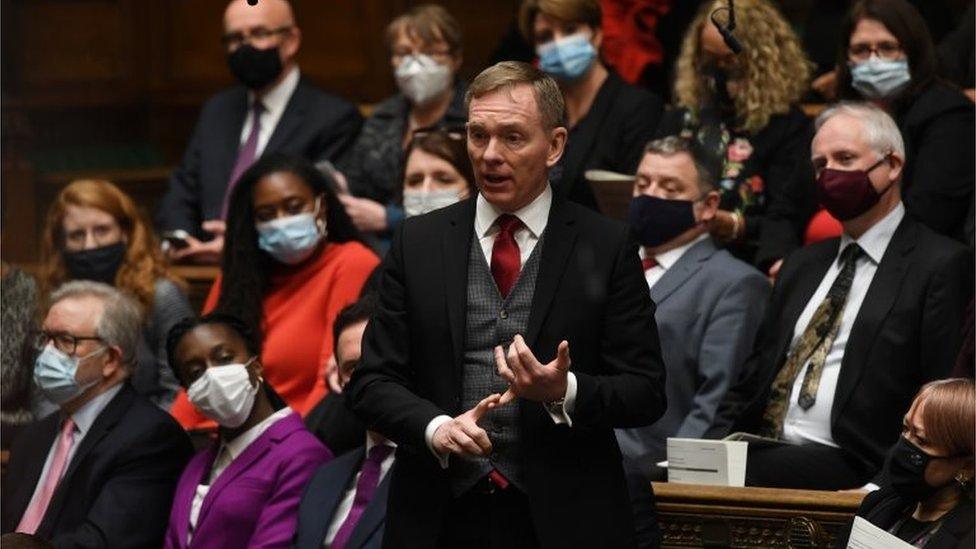
Chris Bryant will make a statement on his committee's ethic report
The main debates are on subjects chosen by the Backbench Business Committee, starting with one on the threat to break up the former Yugoslavian state of Bosnia and Herzegovina, led by the Conservative Alicia Kearns, Labour's Sarah Champion and the SNP's Stuart Malcolm McDonald.
Next is a debate on economic crime, led by Labour's Dame Margaret Hodge and Conservative Kevin Hollinrake.
This is the latest step in a long-running campaign against money laundering, and will see calls for a register of beneficial ownership of assets owned by companies based in the British Virgin Islands and other overseas territories - to make it harder for what Dame Margaret calls "kleptocrats" to conceal wealth looted from their countries, a tightening of procedures, and more checks on the registration of new companies at Companies House and tougher rules on corporate liability.
These are all areas in which successive governments have promised action, but failed to deliver.
The day ends with an adjournment debate led by former cabinet minister Maria Miller on Deepfake and Nudification technologies which allow the image of individuals (almost always women) to be manipulated so that they appear naked, with the aim of humiliating or vilifying them.
In the Lords (11:00) there are questions to ministers on appointing a Patient Safety Commissioner, and on whether maximising gas and oil extraction from the North Sea is compatible with the UK's climate change commitments.
The main debates are on the BBC's value to the UK and a wider global audience - featuring Radio 4's Lord Bragg - and on the continuing detention of Nazanin Zaghari-Ratcliffe by Iran.
Friday 3 December
The Commons meets (09:30) to debate another batch of private members' bills - starting with the Second Reading of Copyright (Rights and Remuneration of Musicians, Etc.) Bill, which aims to boost the rights to royalties musicians receive from streaming services.
It's proposed by Labour MP and Digital Culture Media and Sport Committee member Kevin Brennan, who's just released his own album.
His bill is based on the committee's recent inquiry and report but at the moment he does not have government support.
Then comes the Second Reading of the Labour MP Chris Bryant's Acquired Brain Injury Bill, which aims to commit the government to prepare and publish a strategy document designed to meet the needs of people living with ABI.
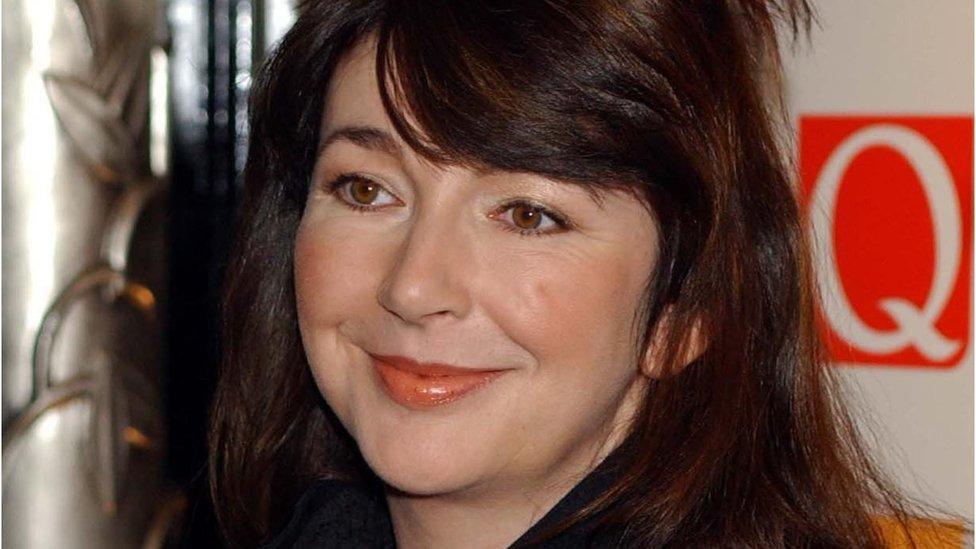
Kate Bush was one of more than 230 artists who wrote to the prime minister asking for reforms of royalties
Next are the Second Readings of the Asylum Seekers (Permission to Work) Bill, from the SNP's Carol Monaghan, and the Miscarriage Leave Bill, proposed by the SNP's Angela Crawley.
As usual on a Friday, there are dozens of bills listed for debate on the Order Paper, but normally only the first three or four, at the most, get discussed.
In the Lords (10:00) it's déjà vu all over again as Labour's Lord Grocott makes his umpteenth attempt to pass a bill to abolish the by-elections which top up the contingent of 92 hereditary peers who still sit in the House of Lords.
The ritual around these bills has now solidified into a predictable routine. Lord Grocott denounces the absurdity of by elections where candidates frequently outnumber voters (the hereditary peers for each party vote on a successor to a departed colleague - and this can mean a handful of voters, in the case of Labour and the Lib Dems, choosing between dozens of candidates to take a seat on the red benches), while at a later stage of debate, hereditaries like Lord Caithness and Lord Trefgarne propose scores of amendments until time runs out.
That is followed by the Second Reading of the Cigarette Stick Health Warnings Bill, and finally there is committee consideration of the Education (Environment & Sustainable Citizenship) Bill.
- Published29 October 2021

